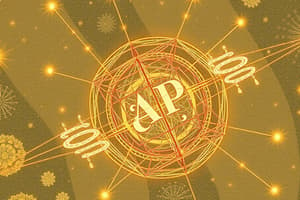Podcast
Questions and Answers
Thermodynamics emphasizes core concepts such as phase transitions, heat engines, entropy, and the Carnot ______.
Thermodynamics emphasizes core concepts such as phase transitions, heat engines, entropy, and the Carnot ______.
cycle
Semiconductor physics continues to feature prominently due to its importance in contemporary ______.
Semiconductor physics continues to feature prominently due to its importance in contemporary ______.
devices
Applications like solar cells and transistor action make semiconductors central to our technological ______.
Applications like solar cells and transistor action make semiconductors central to our technological ______.
landscape
The study of electrostatics involves the behavior of stationary ______.
The study of electrostatics involves the behavior of stationary ______.
Dual nature refers to the wave-particle duality of ______.
Dual nature refers to the wave-particle duality of ______.
______ is set to appear once again in the coming years, covering electric fields, capacitors, dielectrics, Gauss' Law, and electrostatic potential energy
______ is set to appear once again in the coming years, covering electric fields, capacitors, dielectrics, Gauss' Law, and electrostatic potential energy
The wave-particle duality introduces us to the enigma known as the photon, electrons, and ______
The wave-particle duality introduces us to the enigma known as the photon, electrons, and ______
Approximately 7% to 8% of the material may dedicate itself to static electricity and associated ______
Approximately 7% to 8% of the material may dedicate itself to static electricity and associated ______
The beautiful dance of overlapping sinusoidal functions takes center stage as light interacts and constructively/destructively interferes at molecular scales, resulting in diffraction, interference, reflection, refraction, and ______ behaviors
The beautiful dance of overlapping sinusoidal functions takes center stage as light interacts and constructively/destructively interferes at molecular scales, resulting in diffraction, interference, reflection, refraction, and ______ behaviors
The existence of topics such as de Broglie wavelength and Schrödinger's equation indicates that the fundamental principle of ______ will remain integral to advanced discussions
The existence of topics such as de Broglie wavelength and Schrödinger's equation indicates that the fundamental principle of ______ will remain integral to advanced discussions
Flashcards are hidden until you start studying
Study Notes
Exploring the World of Advanced AP Physics: Thermodynamics, Semiconductors, Electrostatics, Dual Nature, Superposition of Waves
In the context of the upcoming AP Physics exams for the academic year 2024–25, several fascinating realms within the discipline come into sharp focus when discussing themes such as thermodynamics, semiconductors, electrostatics, dual nature, and superposition of waves. Prepared by analyzing recent College Board announcements, as well as trends in state board examinations, let's delve deeper into what you might expect to find on your AP Physics exams and beyond.
Thermodynamics
With the addition of fluid dynamics to AP Physics 1 (from AP Physics 2) comes a renewed emphasis on thermodynamics. Recent board exam patterns suggest approximately 7% to 10% coverage for this section, touching upon core concepts such as phase transitions, heat engines, entropy, and the Carnot cycle.
Semiconductors
Although not explicitly mentioned in the College Board's updates, semiconductor physics likely continues to feature prominently due to its importance in contemporary devices. Applications like solar cells and transistor action make semiconductors central to our technological landscape and warrant careful study for prospective physicists and engineers.
Electrostatics
Enduring its status as a staple portion of curricula worldwide, electrostatics—covering electric fields, capacitors, dielectrics, Gauss' Law, and electrostatic potential energy—is set to appear once again in the coming years. Approximately 7% to 8% of the material may dedicate itself to static electricity and associated phenomena.
Dual Nature
Delving into the quantum realm, the wave-particle duality introduces us to the enigma known as the photon, electrons, and entanglement. Although not directly named among the AP Physics course alterations, the existence of topics such as de Broglie wavelength and Schrödinger's equation indicates that this fundamental principle will remain integral to advanced discussions, in line with past exam patterns.
Superposition of Waves
Finally, the beautiful dance of overlapping sinusoidal functions takes center stage as light interacts and constructively/destructively interferes at molecular scales, resulting in diffraction, interference, reflection, refraction, and polarization behaviors. These principles underlie numerous optical instruments and imagery systems, making them worthwhile studies regardless of whether they specifically appear on the new exam blueprint.
Remember that while trends indicate certain emphases, the exact makeup of each exam will ultimately vary. Nonetheless, studying these five critical areas provides a solid foundation for navigating the dynamic world that awaits you. Happy learning!
Studying That Suits You
Use AI to generate personalized quizzes and flashcards to suit your learning preferences.




